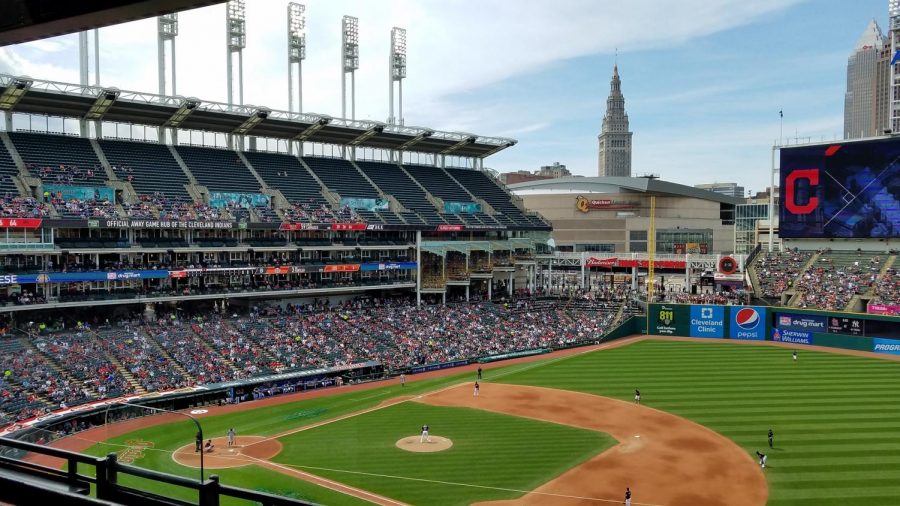Yes, Sports Do Matter
Feb 13, 2020
The score is 93-89. The Cavs are in the lead with 10.6 seconds left. My whole family is gathered around the TV. Picked-over buffalo chicken dip and Tostitos crumbs are scattered all over the coffee table next to half-filled liters of Diet Coke. My 8-year-old cousin Jake paces throughout the room, muttering to himself, “We have to win right? We’re up by 4, and there’s not that much time left. We just HAVE to win.”
“Jake, shut up and sit down!” his twin brother Jax shoots back. “Okay, okay, sorry.” Jake sits down in my dad’s chair, as my dad scavenges for nacho remnants in the kitchen. “Whoa, what are you doing?” my dad yells at Jake upon returning with a plate of mostly sour cream and jalapenos. “You’re going to ruin the karma! Get up, quick! The game is back on!”
Even my great aunt and grandma, who have never watched a sports game in their lives, are on the edge of their seats. “Who’s that one?” my grandma whispers to my sister, pointing at Steph Curry. “The bad guy,” answers my sister. “Come on Bon, that’s Stephen Curry,” my great aunt replies, trying to impress my cousins with her sports knowledge.
We focus our attention back on the game. This is it. The camera pans to the sea of maroon and gold as 20,562 people hold their breath. Curry shoots a three-pointer. My family simultaneously gasps, exhaling after the ball ricochets off the rim. Speights desperately throws the ball up. And misses.
“It’s over, it’s over! Cleveland is a city of champions once again!” Mike Breen announces. Jake rolls around on the floor. Jax jumps on my sister’s back. My dad and uncle go in for the bro hug, excitement causing them to default to a real hug instead. My grandma even got out of her chair to give me a high five and, let me tell you, THAT is a big deal.
Our celebration mimicked that of the entire city back in 2016 when the Cleveland Cavaliers won the NBA Championship. People flooded the streets, climbed on top of cars and hung on street lights. Strangers were exchanging hugs and high fives.
Only one thing could create this electric energy in Cleveland — sports.
Sports have the uncanny ability to build and strengthen communities like nothing else can. From the professional level to Little League, sports allow people to make best friends with the strangers seated to their left and right. Individual differences are left outside the gate, and thousands of people are instantly connected through one common goal: rooting for the home team.
Not only can sports unite absolute strangers, but they can bring together family members too. Sports span generations. For example, my dad and I have had a tumultuous relationship, we have always relied on baseball as our anchor.
As long as I can remember, my dad has taken me to Cleveland Indians games, and I’ve learned that there are very few problems that can’t be solved with a bag of peanuts and a ballpark hot dog.
While chatting about balls and strikes, my dad and I have had the best conversations. Indians games have served as the backdrop for sharing our triumphs and downfalls, from exciting news about family vacations and college acceptance letters to heartbreaking disappointments about losing jobs and family illnesses. Sports have not only been a source of entertainment, but a fundamental part of my relationship with my dad.
This experience with sports is not uncommon, as they are the center of many relationships, especially in schools. Sports create a sense of school spirit that unites students with faculty, staff, parents and alumni, laying the groundwork for a healthy school culture. Whether it’s the Cleveland Cavaliers or the Shaker Heights Raiders, sports provide members of the school community with an identity and a common cause to rally behind.
In addition to the obvious physical benefits, joining a sports team is an easy way for students to make friends, as they can use the game as a vehicle for conversation.
Sports also introduce young people to positive mentor figures, such as older players and coaches. In an article from Edutopia.org, Paige Maslen discusses the numerous social benefits of playing sports, such as improved communication skills and an affinity for collaboration.
Although some argue that sports are divisive, being part of a sports team means becoming part of a family. You learn to depend on others and to let others depend on you.
In addition to the social aspect, playing sports has the obvious benefit of physical activity, which is proven to help students academically. Contributing researchers to the American Journal of Health Behavior compiled 20 studies that found a positive relationship between physical activity and academic performance among students aged 5 to 17. The researchers also established the same positive relationships specifically between participation and higher grades.
While most would not dispute these positive benefits, one common criticism of sports is their cultivation of sometimes harmful forms of competition for both players and spectators. I concede that, without guidance, competition can become extreme, devolving into unnecessary pressure and irrational anger; however, this is the extreme for a reason.
When utilized in a healthy way, the value of competition embedded within sports yields one of the most important qualities a person can have: resilience.
During any sport, failure is inevitable — a strikeout, missed shot, incomplete pass. What is also inevitable is an opportunity for redemption. Within a game, you have no time to sulk in self-pity because the next play is already in motion. You fail, you accept and you move on.
Not only do sports teach us how to accept failure, they teach us how to embrace it. Red Sox player Ted Williams famously said, “Baseball is the only field of endeavor where a man can succeed three times out of 10 and be considered a good performer.”
According to statistics from the various sports halls of fame, professional baseball players miss the ball 70% of the time, basketball players miss 50% of their shots and NFL quarterbacks miss half of their passes. In a world that demands perfection, sports convey the message that failure is not only a natural occurrence in life but also a necessary component of success.
This idea of accepting failure also applies to spectators, who are often accused of being overly aggressive about a “meaningless game.” However, this passion stems from everything that the games represent, which is the spirit, resilience and hope of an entire community.
To reduce sports to mindless forms of entertainment neglects everything that they represent. For Cleveland, winning the NBA championship back in 2016 was about a lot more than flashy rings and a little gold statue.
Rather, it embodied the spirit of a gritty community that, despite being overlooked, criticized and used as the punchline of countless jokes, has never lost hope. All this was poignantly represented by a seemingly commonplace net and ball.













